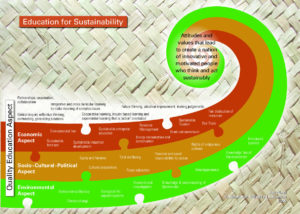Why has the EU co-financed a project to develop a blended training course for teachers in vocational skills?
There are two parts to this question.
- Why education for sustainability?
- Why education for sustainability in vocational skills?
Why education for sustainability?
Scientists just moved the doomsday clock half a second closer to midnight so that it is now two and a half minutes off midnight which is the time when catastrophe for the planet will occur. The clock was started in 1947 when it stood at 7 minutes to midnight.
If total world annihilation is too much to take in then you could focus on yourself as an individual and find out how much you use in the way of resources and how many planets we would need to support your lifestyle if everyone on the planet consumed the same as you. This is known as calculating your environmental footprint. Anything over 1 planet is catastrophe.
ie the issue is urgent and if mankind does not change its behaviour on a massive scale then life is going to become increasingly impossible. Manifestations of that include human-induced climate change, dwindling fossil fuel resources and extinction of key plant and animal species.
This means questioning many of our most basic assumptions, for example that it is desirable to have an ever-increasing salary and an ever-increasing amount of stuff that you own, or on a larger scale, that the best way of measuring a country’s well-being is by increasing its Gross National Product.
This all sounds pretty radical, because it is. It sounds overwhelming. But there have been organisations working on education for sustainability for quite some time now. The United Nations has included sustainability as one of its Sustainable Development Goals to be achieved by 2030. And UNESCO has taken up the torch of education for sustainability with for example this fairly comprehensive free online course.
Why EfS in vocational skills training?

A look at one of the standard depictions of what is covered in Education for Sustainability (EfS) shows that there are some areas such as peace education that will have less relevance for an aspiring cook than for example thinking in practical terms about the sourcing of ingredients and the effects of cleaning using different substances. [You might want to enlarge the diagram by clicking on it]. And since vocational education is often less well-endowed with resources, there is a clear need to adapt what has been developed for schools, to a specific set of vocational areas.
This then is the task of the Prof E Sus project (Education for Professionals in household and guest-oriented businesses) that is being co-financed by the European Union under the Erasmus+ programme.
If you want to find out more, I shall be setting out some of the basics of our project at the Connecting Online 2017 free online conference on Friday Feb 4th at 10:00 am EST (15:00 UTC/GMT – 16:00 CET)
Future posts will be looking at
- The basics of sustainability
- Learning outcomes for sustainability in vocational training
- How to make the blend between online and face to face
- Exploring values in sustainability
- Why the UNs SDGs may not be the best benchmark
- Using a sustainability model for assessment (moving away from Micky Mouse)
